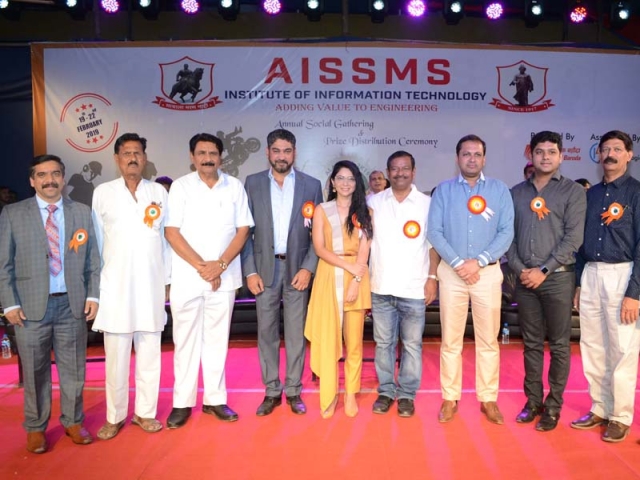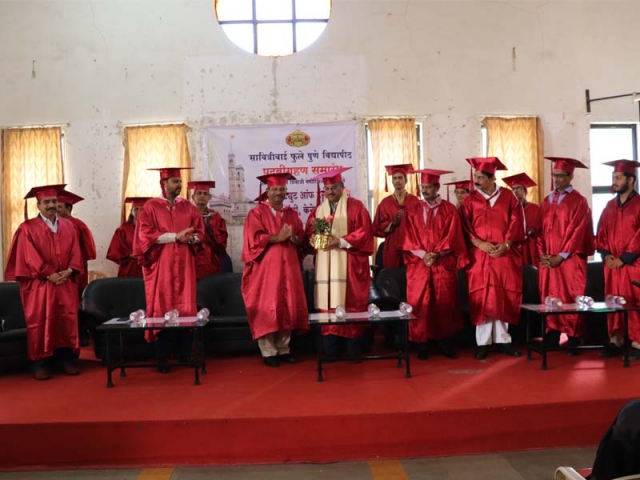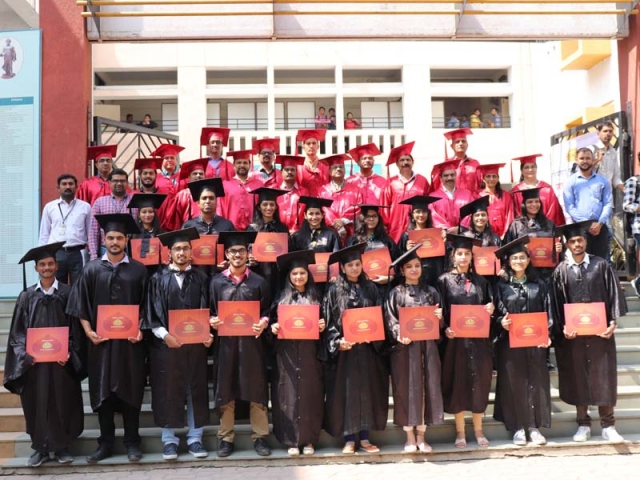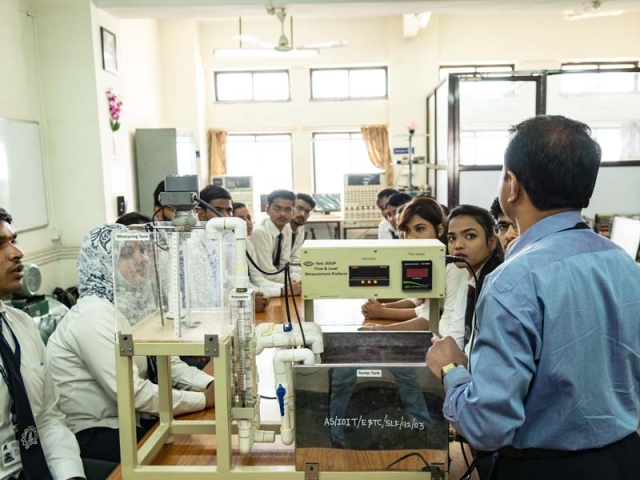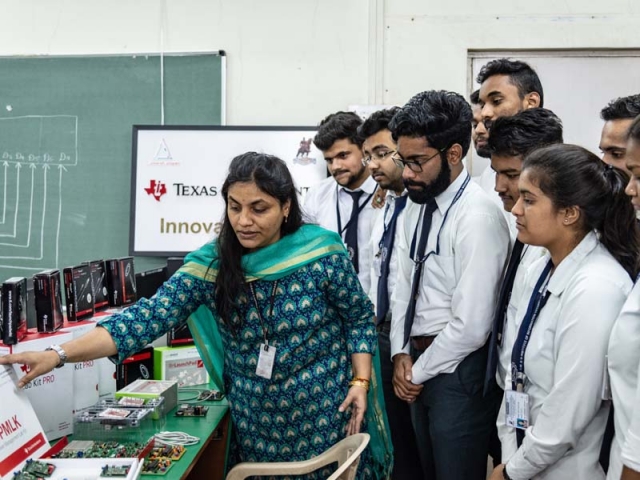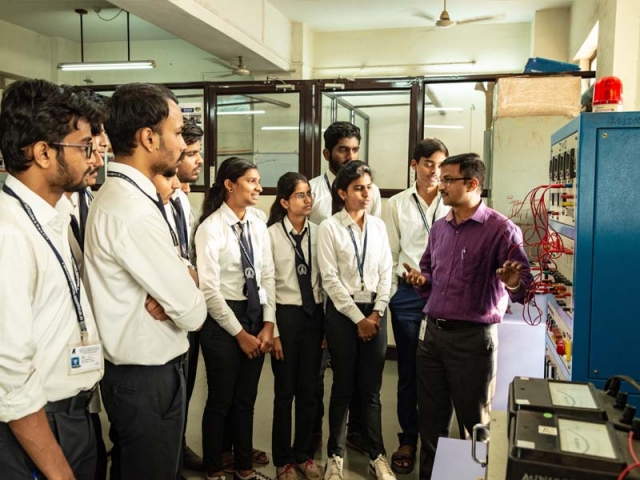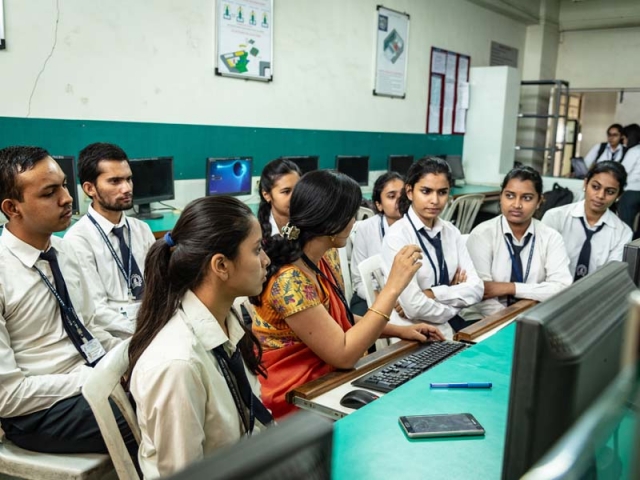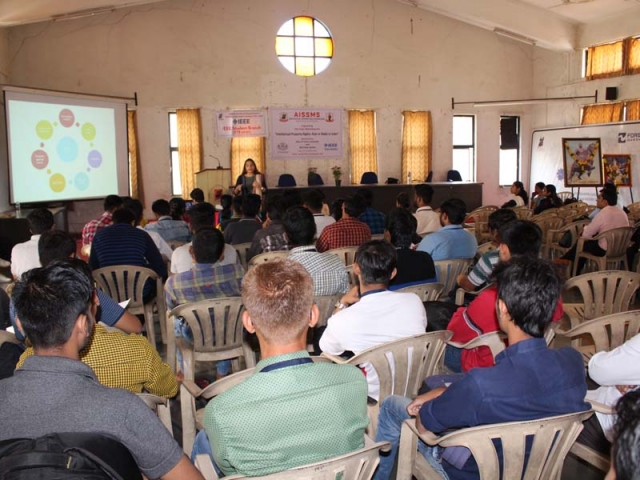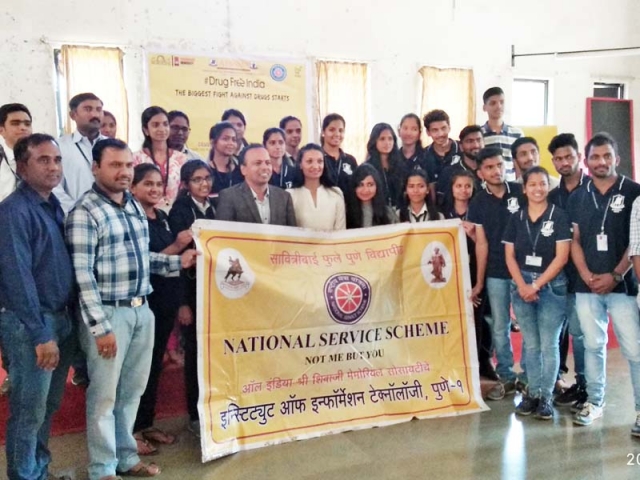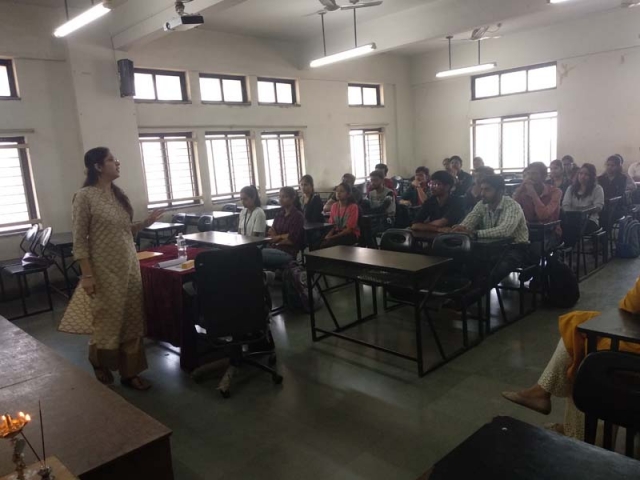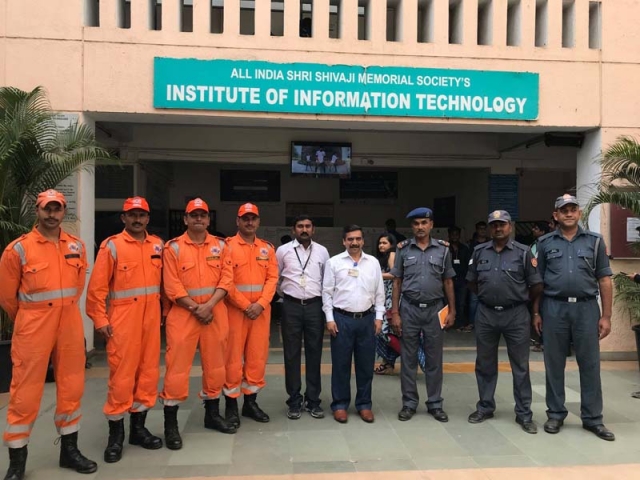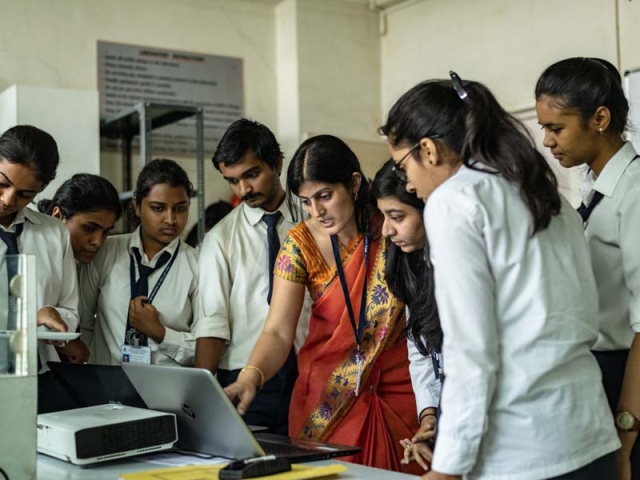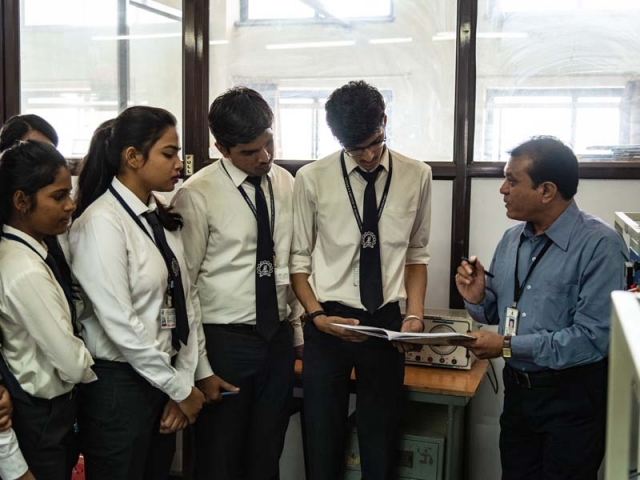Vision
To be a leader in preparing technically competent and skillful IT Graduates to address the needs of industry and society.
Mission
1. To prepare students for employment/entrepreneurship/higher studies through curricular, extracurricular and extension activities.
2. To promote research and professional activities through industry involvement and professional bodies.
3. To instil professional ethics and lifelong learning skills with concern for the society.
2. To promote research and professional activities through industry involvement and professional bodies.
3. To instil professional ethics and lifelong learning skills with concern for the society.
Program Educational Objective
PEO1: Excel in diverse career paths with core professional skills.
PEO2: Engage in multi domain research/professional activities.
PEO3: Cater to the needs of society with IT solutions/applications.
PEO2: Engage in multi domain research/professional activities.
PEO3: Cater to the needs of society with IT solutions/applications.
PROGRAM SPECIFIC OUTCOMES
PSO1: Use database, networking and programming technologies for solving real life problems.
PSO2: Develop applications in the field of computing, networking, security and analytics.
PSO2: Develop applications in the field of computing, networking, security and analytics.
Program Outcomes
Engineering Graduates will be able to
- Apply the knowledge of mathematics, science, engineering fundamentals, and an engineering specialization to the solution of complex engineering problems. [Engineering knowledge]
- Identify, formulate, research literature, and analyse complex engineering problems reaching substantiated conclusions using first principles of mathematics, natural sciences, and engineering sciences. [Problem analysis]
- Design solutions for complex engineering problems and design system components or processes that meet the specified needs with appropriate consideration for the public health and safety, and the cultural, societal, and environmental considerations. [Design/development of solutions]
- Use research-based knowledge and research methods including design of experiments, analysis and interpretation of data, and synthesis of the information to provide valid conclusions. [Conduct investigations of complex problems]
- Create, select, and apply appropriate techniques, resources, and modern engineering and IT tools including prediction and modeling to complex engineering activities with an understanding of the limitations. [Modern tool usage]
- Apply reasoning informed by the contextual knowledge to assess societal, health, safety, legal and cultural issues and the consequent responsibilities relevant to the professional engineering practice. [The engineer and society]
- Understand the impact of the professional engineering solutions in societal and environmental contexts, and demonstrate the knowledge of, and need for sustainable development. [Environment and sustainability]
- Apply ethical principles and commit to professional ethics and responsibilities and norms of the engineering practice. [Ethics]
- Function effectively as an individual, and as a member or leader in diverse teams, and in multidisciplinary settings. [Individual and team work]
- Communicate effectively on complex engineering activities with the engineering community and with society at large, such as, being able to comprehend and write effective reports and design documentation, make effective presentations, and give and receive clear instructions. [Communication]
- Demonstrate knowledge and understanding of the engineering and management principles and apply these to one’s own work, as a member and leader in a team, to manage projects and in multidisciplinary environments. [Project management and finance]
- Recognize the need for, and have the preparation and ability to engage in independent and life-long learning in the broadest context of technological change. [Life-long learning]
| SECOND YEAR ( SEMESTER: III) | |
|---|---|
| SUBJECT : Discrete Mathematics | |
| Course Outcomes: Students will be able to | |
| C201.1 | Identify techniques of number theory and its application. |
| C201.2 | Identify fundamental algebraic structures. |
| C201.3 | Formulate and apply formal proof techniques and solve the problems with logical reasoning. |
| C201.4 | Analyze and evaluate the combinatorial problems by using probability theory. |
| C201.5 | Apply the concepts of graph theory to devise mathematical models |
| C201.6 | Analyze types of relations and functions to provide solutions to computational problems. |
| SUBJECT : Logic Design & Computer Organization | |
| Course Outcomes: Students will be able to | |
| C202.1 | Perform basic binary arithmetic & simplify logic expressions |
| C202.2 | Grasp the operations of logic ICs and Implement combinational logic functions using ICs. |
| C202.3 | Comprehend the operations of basic memory cell types and Implement sequential logic functions using ICs. |
| C202.4 | Elucidate the functions & organization of various blocks of CPU. |
| C202.5 | Understand CPU instruction characteristics, enhancement features of CPU |
| C202.6 | Describe an assortment of memory types (with their characteristics) used in computer systems and basic principle of interfacing input, output devices. |
| SUBJECT : Basics of Computer Network | |
| Course Outcomes: Students will be able to | |
| C203.1 | Explain the concepts of communication theory and compare functions of OSI and TCP/IP model. |
| C203.2 | Analyze data link layer services, error detection and correction, linear block codes, cyclic Codes, framing and flow control protocols. |
| C203.3 | Compare different access techniques, channelization and IEEE standards. |
| C203.4 | Apply the skills of IP addressing and routing mechanisms. |
| C203.5 | Differentiate IPv4 and IPv6 and other network layer protocols |
| C203.6 | Illustrate services and protocols used at transport layer. |
| SUBJECT : Data Structures and Algorithms | |
| Course Outcomes: Students will be able to | |
| C204.1 | Describe and find time complexity of simple algorithms |
| C204.2 | Compare and apply searching and sorting algorithms |
| C204.3 | Discuss and use Stack & Queue data structure for simple applications |
| C204.4 | Describe & use Binary tree Operations for simple applications |
| C204.5 | Discuss the applications of Graphs and symbol tables |
| C204.6 | Use file organizations and Hashing concept |
| SUBJECT : Object-Oriented Programming | |
| Course Outcomes: Students will be able to | |
| C205.1 | Differentiate various programming paradigms and apply basic concepts of OOP. |
| C205.2 | Identify classes, objects, methods, and handle object creation, initialization, and destruction to model real-world problems |
| C205.3 | Identify relationship among objects using inheritance and polymorphism |
| C205.4 | Handle different types of exceptions and perform generic programming. |
| C205.5 | Use file handling for real world application. |
| C205.6 | Apply appropriate design patterns to provide object-oriented solutions. |
| SUBJECT : Soft Skills Lab | |
| Course Outcomes: Students will be able to | |
| C206.1 | Introspect about individual’s goals, aspirations by evaluating one are SWOC and think creatively. |
| C206.2 | Develop effective communication skills i.e. Listening, Reading, Writing and Speaking. |
| C206.3 | Constructively participate in group discussion, meetings and prepare and deliver Presentations. |
| C206.4 | Write precise briefs or reports and technical documents |
| C206.5 | Practice professional etiquette, present oneself confidently and successfully handle personal interviews |
| C206.6 | Function effectively in multi-disciplinary and heterogeneous teams through the knowledge of team work, Inter-personal relationships, conflict management and Leadership quality. |
| SUBJECT : Engineering Mathematics-III | |
| Course Outcomes: Students will be able to | |
| C207.1 | Solve higher order linear differential equations using appropriate techniques for modelling and analyzing electrical circuits. |
| C207.2 | Solve problems related to Fourier Transform, Z-Transform and applications to Signal and Image Processing. |
| C207.3 | Perform statistical methods like correlation, regression to analyze the data. |
| C207.4 | Solve probability theory for analysis and prediction of given data. |
| C207.5 | Transform physical phenomena into vectors, describe gradient, curl, and divergence, also understand Vector Calculus and its applications to Electromagnetic field, solve Line, Volume integrals with their applications in engineering. |
| C207.6 | Analyze conformal mappings, transformations and perform contour integration of complex functions required in Image processing, Digital filters and Computer graphics. |
| SECOND YEAR ( SEMESTER: IV) | |
| SUBJECT : Engineering Mathematics-III | |
| Course Outcomes: Students will be able to | |
| C207.1 | Solve higher order linear differential equations using appropriate techniques for modelling and analyzing electrical circuits. |
| C207.2 | Solve problems related to Fourier Transform, Z-Transform and applications to Signal and Image Processing. |
| C207.3 | Perform statistical methods like correlation, regression to analyze the data. |
| C207.4 | Solve probability theory for analysis and prediction of given data. |
| C207.5 | Transform physical phenomena into vectors, describe gradient, curl, and divergence, also understand Vector Calculus and its applications to Electromagnetic field, solve Line, Volume integrals with their applications in engineering. |
| C207.6 | Analyze conformal mappings, transformations and perform contour integration of complex functions required in Image processing, Digital filters and Computer graphics. |
| SUBJECT : Computer Graphics | |
| Course Outcomes: Students will be able to | |
| C208.1 | Apply mathematical and logical aspects for developing elementary graphics operations like scan conversion of points, lines, circle, and apply it for problem solving |
| C208.2 | Employ techniques of geometrical transforms to produce, position and manipulate objects in 2 dimensional and 3-dimensional space respectively. |
| C208.3 | Describe mapping from a world coordinates to device coordinates, clipping, and projections in order to produce 3D images on 2D output device. |
| C208.4 | Understand the foundations of computer graphics: hardware systems, math basis, light and color |
| C208.5 | Apply concepts of rendering, shading, animation, curves and fractals are using computer graphics tools in design, development and testing of 2D, 3D modeling applications. |
| C208.6 | Perceive the concepts of virtual reality. |
| SUBJECT : Processor Architecture | |
| Course Outcomes: Students will be able to | |
| C209.1 | Become aware of architecture and memory organization of PIC 18 microcontroller. |
| C209.2 | Apply embedded C knowledge for programming of PIC 18. |
| C209.3 | Make use of concepts of timers, serial ports, CCP mode, ADC, DAC, memory devices and interrupts of PIC 18. |
| C209.4 | Demonstrate real life applications using PIC 18. |
| C209.5 | Calculate delay time, baud rate, and instruction execution time required for real time applications. |
| C209.6 | Analyze architectural details of ARM processor. |
| SUBJECT : Database Management Systems | |
| Course Outcomes: Students will be able to | |
| C210.1 | Describe the basics of database management system. |
| C210.2 | Use the relational model for the graphical representation of database. |
| C210.3 | Write the queries using SQL and PLSQL. |
| C210.4 | Describe the process of database design and query processing. |
| C210.5 | Describe the database transaction and concurrency control. |
| C210.6 | Describe the parallel and distributed databases. |
| SUBJECT : Software Engineering | |
| Course Outcomes: Students will be able to | |
| C211.1 | Identify unique features of various software applications & Describe principles of classic process models with agile development, discuss the SCRUM process and distinguish agile process models from other process models. |
| C211.2 | Analyze software requirements by applying various modeling techniques. |
| C211.3 | Discuss the significance of various design concepts like coupling and cohesion |
| C211.4 | Discuss IT project management through the life cycle of the project and future trends in IT Project Management. |
| C211.5 | Describe the concepts of configuration management, & quality assurance |
| C211.6 | Discuss recent trends and Research in software engineering. |
| SUBJECT : Audit Course 3(Ethics and values in IT) | |
| Course Outcomes: Students will be able to | |
| AC3.1 | Adapt the global ethical principles and modern ethical issues. |
| AC3.2 | Apprehend ethics in the business relationships and practices of IT. |
| AC3.3 | Implement trustworthy computing to manage risk and security vulnerabilities |
| AC3.4 | Analyze concerns of privacy, privacy rights in information-gathering practices in IT |
| THIRD YEAR ( SEMESTER: V) | |
| SUBJECT : Theory of Computation | |
| Course Outcomes: Students will be able to | |
| C301.1 | Design finite state machines, to solve problems in computing |
| C301.2 | Write formal language into regular expression |
| C301.3 | Construct context free grammar for given language |
| C301.4 | Design and analyze push down automata and post machines for CFG |
| C301.5 | Construct Turing machine for unrestricted languages. |
| C301.6 | Describe the decidable & undecidable problems and analyze time complexity. |
| SUBJECT : Database Management System | |
| Course Outcomes: Students will be able to | |
| C302.1 | Describe basic functions and applications of DBMS & represent database with suitable data model |
| C302.2 | Apply the knowledge of database design and use SQL commands. |
| C302.3 | Describe query processing & database transactions. |
| C302.4 | Describe concurrency control, recovery methods & database architecture. |
| C302.5 | Demonstrate the knowledge of large-scale database management tools. |
| C302.6 | Describe the concepts of data mining and data warehousing. |
| SUBJECT : Software Engineering & Project Management | |
| Course Outcomes: Students will be able to | |
| C303.1 | Identify unique features of various software application domains and classify software applications. |
| C303.2 | Choose and apply the appropriate lifecycle model of software Development. |
| C303.3 | Analyze software requirements by applying various modeling techniques. |
| C303.4 | Describe principles of agile development, discuss the SCRUM process and distinguish agile process models from other process models. |
| C303.5 | Discuss IT project management through the life cycle of the project and future trends in IT Project Management. |
| C303.6 | List and classify CASE tools and discuss recent trends and Research in software engineering. |
| SUBJECT : Operating System | |
| Course Outcomes: Students will be able to | |
| C304.1 | Outline operating system functions, design consideration for different operating systems and use shell programming concepts. |
| C304.2 | Describe concept of process, threads and scheduling algorithm. |
| C304.3 | Discuss deadlock problems and provide ways to handle it with examples. |
| C304.4 | Describe various memory management techniques. |
| C304.5 | Discuss the concept of I/O management, file management. |
| C304.6 | Demonstrate the concept of Linux operating system and form basis for further learning. |
| SUBJECT : Human-Computer-Interaction | |
| Course Outcomes: Students will be able to | |
| C305.1 | Describe Human Computer Interaction, its importance and principles. |
| C305.2 | Outline human factors in HCI design. |
| C305.3 | Discuss different interaction styles and paradigms. |
| C305.4 | Illustrate user-interfaces following a structured and organized UCD process. |
| C305.5 | Evaluate usability of a user-interface design by applying standard guidelines and evaluation techniques. |
| C305.6 | Apply cognitive models for predicting human-computer-interactions. |
| THIRD YEAR ( SEMESTER: VI) | |
| SUBJECT : Computer Network Technology | |
| Course Outcomes: Students will be able to | |
| C306.1 | Describe the working services offered and protocol used at each layer of network. |
| C306.2 | Apply the knowledge and write a socket program under the Transport layer. |
| C306.3 | Identify the networking issues and learn application layer protocols. |
| C306.4 | Classify, know the different wireless technologies and IEEE standards. |
| C306.5 | Demonstrate the knowledge of Adhoc wireless networks and its design issues. |
| C306.6 | Make the base for further learning in the communication network domain. |
| SUBJECT : System Programming | |
| Course Outcomes: Students will be able to | |
| C307.1 | Use the basic concepts and needs of system software. |
| C307.2 | Design and implement assembler’s macro processors and loaders. |
| C307.3 | Use tool LEX for generation of Lexical Analyzer. |
| C307.4 | Apply and use YACC tool for generation of syntax analyzer. |
| C307.5 | Demonstrate all the phases of the compiler. |
| C307.6 | Apply code optimization in the compilation process. |
| SUBJECT : Design and Analysis of Algorithm | |
| Course Outcomes: Students will be able to | |
| C308.1 | Calculate computational complexity using asymptotic notations for various algorithms. |
| C308.2 | Apply Divide & Conquer as well as Greedy approach to design algorithms. |
| C308.3 | Apply dynamic programming for optimality. |
| C308.4 | Select a backtracking strategy for different problems. |
| C308.5 | Use Branch and Bound strategy for different problems. |
| C308.6 | Classify non deterministic algorithms. |
| SUBJECT : Cloud Computing | |
| Course Outcomes: Students will be able to | |
| C309.1 | Describe the need of Cloud based Solutions |
| C309.2 | Discuss security mechanisms and issues in various cloud applications |
| C309.3 | Describe effective techniques to program cloud programs |
| C309.4 | Discuss current challenges and trade-offs in Cloud Computing |
| C309.5 | Find challenges in Cloud Computing and suggest effective solutions |
| C309.6 | Discuss emerging trends in Cloud Computing and will for basis for further learning. |
| SUBJECT : Data Science and Big Data Analytics | |
| Course Outcomes: Students will be able to | |
| C310.1 | Describe Big Data primitives. |
| C310.2 | Apply different mathematical models for Big Data. |
| C310.3 | Demonstrate their Big Data learning skills by developing industry or research applications. |
| C310.4 | Analyze each learning model come from a different algorithmic approach and it will perform differently under different datasets. |
| C310.5 | Apply big data visualization techniques. |
| C310.6 | Use different programming platforms for big data analytics. |
| SUBJECT : Project Based Seminar | |
| Course Outcomes: Students will be able to | |
| C311.1 | Collect, organize, summarize and interpret technical literature with the purpose of formulating a project proposal. |
| C311.2 | Write a technical report summarizing state-of-the-art on an identified topic. |
| C311.3 | Present the study using graphics and multimedia presentations. |
| C311.4 | Define intended future work based on the technical review. |
| C311.5 | Explore and enhance the use of various presentation tools and techniques. |
| C311.6 | Use effectively the scientific approaches for literature survey and paper writing |
| SUBJECT : Software Laboratory -3 | |
| Course Outcomes: Students will be able to | |
| C312.1 | Identify the needs of users through requirement gathering for project development |
| C312.2 | Apply the concepts of Software Engineering process models for project development. |
| C312.3 | Apply the concepts of HCI for user-friendly project development. |
| C312.4 | Deploy website on live webserver and access through URL. |
| C312.5 | Explore and apply various web technologies. |
| C312.6 | Develop team building for efficient project development. |
| SUBJECT : Audit Course 5(Digital and Social Media Marketing) | |
| Course Outcomes: Students will be able to | |
| AC5.1 | Identify some of the latest digital marketing trends and skill sets needed for today’s marketer. |
| AC5.2 | Describe techniques of effective marketing using digital platform |
| AC5.3 | Analyze social media network from analysis point of view. |
| AC5.4 | Pursue digital marketing as a long-term career opportunity |
| FINAL YEAR SEMESTER: VIII | |
| SUBJECT : Distributed Computing System | |
| Course Outcomes: Students will be able to | |
| C406.1 | Describe principles, desired properties and models of distributed systems. |
| C406.2 | Develop distributed applications based on TCP/UDP Sockets, P2P, RPC/RMI and MPI. |
| C406.3 | Discuss the concepts of replication and fault tolerance in distributed systems as well as catching & replication on the web. |
| C406.4 | Apply the concepts of distributed systems to implement distributed file and distributed multimedia systems. |
| C406.5 | Apply different models with architecture and develop applications for distributed web based systems. |
| C406.6 | Identify the security challenges faced by distributed systems and select appropriate solutions. |
| SUBJECT : Ubiquitous Computing | |
| Course Outcomes: Students will be able to | |
| C407.1 | Describe ubiquitous computing, its properties applications and architectural design. |
| C407.2 | Discuss various smart devices and services used in ubiquitous computing. |
| C407.3 | Describe the role of sensors and actuators in designing real time applications using Ubicom. |
| C407.4 | Analyze the concept of human computer interaction in the context of Ubicom. |
| C407.5 | Elaborate Ubicom privacy and challenges to privacy. |
| C407.6 | Identify ubicom network with design issues and Ubicom management. |
| SUBJECT : Internet and Web Programming -Elective-III | |
| Course Outcomes: Students will be able to | |
| C408.1 | Demonstrate the knowledge through static website using basic tools. |
| C408.2 | Develop program for client side in client-server architecture |
| C408.3 | Develop program for Server side in client-server architecture |
| C408.4 | Classify web services and explain content management system. |
| C408.5 | Use the knowledge for mobile web development. |
| C408.6 | Explore the concept of web security and follow cyber ethics. |
| SUBJECT : Social Media Analytics-Elective-IV | |
| Course Outcomes: Students will be able to | |
| C409.1 | Analyze different social media and types of analytics tools |
| C409.2 | Visualize Social network and describe the significance of Data mining in Social media. |
| C409.3 | Demonstrate the algorithms used for text mining. |
| C409.4 | Apply network measures for social media data. |
| C409.5 | Describe Behavior Analytics techniques used for social media data. |
| C409.6 | Apply social media analytics for Face book and Twitter kind of applications |
| SUBJECT : Project Phase-I | |
| Course Outcomes: Students will be able to | |
| C410.1 | Perform independently in chosen domain of Information Technology and programming languages and apply their acquired knowledge to a variety of real time problem scenarios. |
| C410.2 | Demonstrate professional, ethical, legal, security and social issues and responsibilities related to Project. |
| C410.3 | Use literature to identify the objective, scope and the concept of the work. |
| C410.4 | Develop a prototype/experimental set-up necessary to complete the project |
| SUBJECT : Project Work | |
| Course Outcomes: Students will be able to | |
| C410.1 | Perform detailed analysis/ modelling/ simulation/ design/ problem solving/ experiment as needed. |
| C410.2 | Develop project modules, perform testing, discuss results & conclusions and suggest future directions. |
| C410.3 | Get exposure to various types of testing methods and tools. |
| C410.4 | Compile the experimental information to publish in journals/conference |
| SUBJECT : Computer Laboratory-X | |
| Course Outcomes: Students will be able to | |
| C412.1 | Set up the Android environment and explain the Evolution of cellular networks. |
| C412.2 | Develop the User Interfaces using pre-built Android UI components. |
| C412.3 | Create applications for performing CURD SQLite database operations using Android. |
| C412.4 | Create the smart android applications using the data captured through sensors. |
| C412.5 | Implement the authentication protocols between two mobile devices for providing. Security. |
| C412.6 | Analyze the data collected through android sensors using any machine learning algorithm. |
| SUBJECT : Audit Course 7(Statistical Learning Model using R) | |
| Course Outcomes: Students will be able to | |
| AC7.1 | Describe terminology like data science, data analytics and machine learning |
| AC7.2 | Apply basic commands of R |
| AC7.3 | Apply Linear Regression approach for prediction of data |
| AC7.4 | Classify data using classification algorithms |

